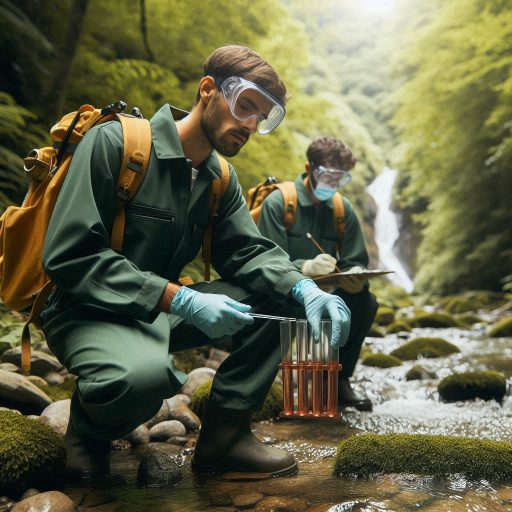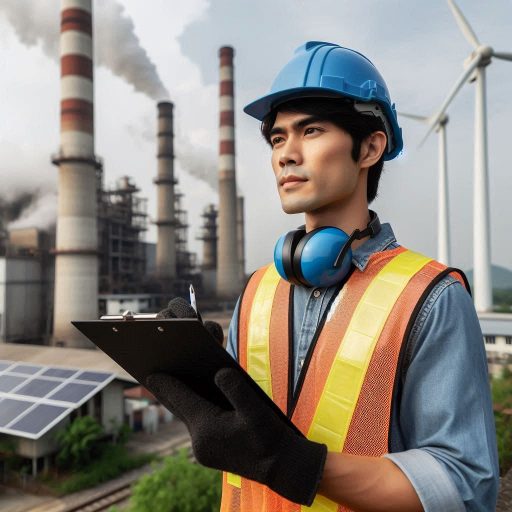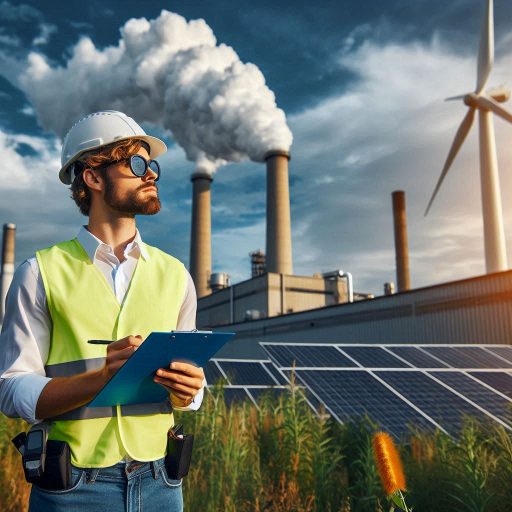Introduction
Environmental technicians are responsible for monitoring and analyzing the environment to ensure it is safe for the public.
Their role is crucial in maintaining public health by identifying and mitigating potential hazards.
They collect samples of air, water, and soil to test for pollutants, helping to prevent illnesses caused by contaminated resources.
Environmental technicians also assess industrial sites to minimize harmful emissions and protect nearby communities.
By identifying environmental risks early on, these professionals play a vital role in preventing widespread health issues and ensuring a safer living environment for all.
In addition, they collaborate with government agencies and organizations to develop and implement strategies for environmental conservation and public health protection.
Environmental technicians are instrumental in promoting sustainability and safeguarding the well-being of the population.
Overall, the work of environmental technicians directly impacts public health by monitoring, analyzing, and addressing environmental factors that can contribute to disease and endanger the well-being of individuals and communities.
Their dedication to safeguarding the environment ultimately translates into a healthier and safer future for generations to come.
Identification and Monitoring of Environmental Hazards
Environmental technicians play a crucial role in safeguarding public health by identifying and monitoring environmental hazards.
These experts use a variety of tools and techniques to detect potential dangers in our surroundings.
They often start by conducting comprehensive surveys of areas prone to contamination.
This includes examining industrial sites, agricultural fields, and waste disposal areas.
Technicians utilize specialized equipment to collect samples from air, water, and soil.
These samples are then analyzed for pollutants and toxins.
Advanced technologies like air quality monitors, water testing kits, and soil analysis instruments help in this process.
By identifying the presence and concentration of hazardous substances, technicians can assess the risk they pose to public health.
Importance of Monitoring Air, Water, and Soil Quality
Monitoring air, water, and soil quality is vital for protecting public health.
Each of these environmental components can significantly impact human well-being.
For instance, poor air quality can lead to respiratory issues such as asthma and bronchitis.
Pollutants in the air, including particulate matter and harmful gases, can aggravate these conditions.
Water quality is equally important.
Contaminated water can carry pathogens and toxins that cause severe illnesses.
Monitoring water sources helps prevent outbreaks of diseases like cholera and dysentery.
Environmental technicians check for pollutants like heavy metals and harmful chemicals in water bodies.
Soil quality also plays a crucial role in public health.
Contaminated soil can affect food safety and lead to health issues through the food chain.
Technicians analyze soil samples to detect contaminants such as pesticides and heavy metals.
This ensures that the soil remains safe for agricultural use and helps in preventing potential health risks from consuming contaminated produce.
By regularly monitoring these environmental factors, technicians provide essential data that informs public health policies and interventions.
Their work helps in early detection of problems and facilitates timely action to mitigate risks.
This proactive approach ensures that communities remain safe from the adverse effects of environmental hazards.
In summary, environmental technicians are instrumental in identifying and monitoring environmental hazards.
Their efforts in assessing air, water, and soil quality are crucial for maintaining public health.
Their role ensures that potential risks are identified early, and appropriate measures are taken to protect communities.
Read: Networking Tips for Surveying and Mapping Professionals
Assessment of Health Risks
How Environmental Technicians Assess Health Risks Associated with Environmental Hazards
Environmental technicians play a crucial role in assessing health risks linked to environmental hazards.
They use various tools and methods to evaluate potential dangers.
For example, they collect air, water, and soil samples to test for contaminants.
By analyzing these samples, technicians can identify harmful substances present in the environment.
Technicians also conduct site inspections to observe and record potential hazards.
They evaluate factors like the condition of waste storage areas or the proximity of industrial activities to residential zones.
This fieldwork helps in understanding the extent of exposure risks.
Furthermore, environmental technicians use modeling software to predict how pollutants may spread over time.
They input data such as emission rates and meteorological conditions to forecast potential impacts on public health.
This approach helps in assessing long-term risks and planning appropriate interventions.
How This Information Is Used to Protect Public Health
The data collected by environmental technicians is vital for protecting public health.
Health risk assessments inform regulatory agencies about potential dangers.
These agencies can then implement guidelines to control exposure and minimize risks.
For instance, if high levels of a toxic substance are detected in water supplies, technicians’ findings lead to immediate action.
Authorities may issue warnings or enforce treatment measures to ensure water safety.
This proactive approach helps prevent health issues related to contaminated drinking water.
Similarly, air quality assessments help in setting pollution standards.
Technicians’ reports on air pollutants enable the establishment of limits for emissions from industries and vehicles.
These regulations reduce the prevalence of respiratory illnesses and improve overall air quality.
In addition, environmental technicians’ data support public health campaigns.
By highlighting the risks associated with specific environmental hazards, they help raise awareness among communities.
This information educates people on preventive measures and encourages safer practices.
Overall, the work of environmental technicians is fundamental in managing and mitigating environmental health risks.
Their assessments provide the necessary information for protective measures and regulatory actions, ultimately safeguarding public health.
Read: Recent Trends in Surveying and Mapping Technologies
Development and implementation of strategies to mitigate environmental risks
The process of developing strategies to mitigate environmental risks
Developing strategies to mitigate environmental risks involves several critical steps.
The process starts with identifying potential environmental hazards.
This includes analyzing data on pollution sources, emissions, and other factors that contribute to environmental degradation.
Next, environmental technicians collect and assess data through field investigations and monitoring.
They use this information to understand the scope and impact of the risks.
Following this, technicians and environmental scientists collaborate to design targeted strategies.
These strategies might involve pollution control measures, waste management improvements, or habitat restoration projects.
Once the strategies are designed, they are tested in controlled environments to ensure their effectiveness.
After successful testing, the strategies are implemented on a broader scale.
Continuous monitoring and adjustment are essential to address unforeseen challenges and improve the strategies over time.
This systematic approach ensures that the strategies are practical, effective, and adaptable to changing conditions.
The role of environmental technicians in implementing these strategies
Environmental technicians play a crucial role in implementing risk mitigation strategies.
They are responsible for applying the designed strategies in real-world settings.
This involves installing and maintaining pollution control equipment, conducting routine inspections, and ensuring compliance with environmental regulations.
Technicians also manage and monitor environmental data to assess the effectiveness of the strategies.
They use specialized tools and techniques to measure pollution levels, track changes, and identify any issues that may arise.
Their hands-on work ensures that the strategies function as intended and that any problems are addressed promptly.
Additionally, environmental technicians educate the public and businesses about best practices for reducing environmental risks.
They provide guidance on proper waste disposal, energy conservation, and other practices that support environmental health.
Through their direct involvement, technicians bridge the gap between strategy development and practical application, ensuring that environmental protections are effectively implemented and maintained.
Read: Safety Tips for Field Surveying Technicians

Collaboration with other professionals
Importance of Collaboration with Public Health Officials, Policymakers, and Other Professionals
Environmental technicians play a crucial role in ensuring public health by collaborating with various professionals.
This collaboration is essential for addressing complex environmental issues and promoting overall well-being.
Sharing Specialized Knowledge
Working together with public health officials allows environmental technicians to exchange specialized knowledge.
Public health experts can provide valuable insights into the health impacts of environmental factors, while environmental technicians offer technical expertise on identifying and mitigating these factors.
Developing Comprehensive Strategies
Collaborating with policymakers enables environmental technicians to contribute to the development of comprehensive strategies for tackling environmental health challenges.
By working together, they can design policies and regulations that prioritize public health while considering environmental sustainability.
Enhancing Data Collection and Analysis
Teamwork between environmental technicians and other professionals helps improve data collection and analysis processes.
Public health officials can provide guidance on relevant health metrics, while policymakers can ensure that data is used effectively to inform decision-making and policy development.
Teamwork Leading to Better Outcomes for Public Health
The synergy created by teamwork among environmental technicians, public health officials, policymakers, and other professionals can lead to significant improvements in public health outcomes.
By working together, these professionals can achieve the following:
Holistic Approach to Public Health
Collaboration allows for a holistic approach to public health, where environmental, social, and economic factors are considered in tandem.
This comprehensive perspective enables professionals to address underlying causes of health problems and implement more effective solutions.
Targeted Interventions
By pooling their expertise, professionals can design targeted interventions that are tailored to specific communities or populations.
This personalized approach ensures that public health initiatives are more impactful and relevant to the needs of those affected by environmental health issues.
Improved Resource Allocation
Teamwork facilitates better resource allocation for public health initiatives.
By collaborating with policymakers, environmental technicians can advocate for the allocation of sufficient resources to address environmental health concerns, leading to more efficient and effective interventions.
In a nutshell, collaboration with public health officials, policymakers, and other professionals is essential for environmental technicians to make a positive impact on public health.
By working together, these professionals can leverage their respective expertise to address environmental challenges and promote the well-being of communities.
Read: Impact of Drones on Surveying and Mapping
Education and Outreach
The Role of Environmental Technicians in Educating the Public About Environmental Risks
Environmental technicians play a vital role in educating the public about environmental risks.
They possess the expertise to identify hazards and understand their potential health impacts.
By sharing this knowledge, technicians empower communities to make informed decisions.
They often conduct workshops, seminars, and community meetings to disseminate information.
These events address various topics, including pollution, waste management, and chemical safety.
Technicians also create educational materials like brochures and online resources.
Their goal is to raise awareness and promote safe practices.
By translating complex scientific data into understandable language, they make environmental risks more accessible to everyone.
This proactive approach helps communities to recognize and mitigate potential hazards before they become significant health threats.
Transform Your Career Today
Unlock a personalized career strategy that drives real results. Get tailored advice and a roadmap designed just for you.
Start NowHow Outreach Programs Can Help Prevent Health Hazards
Outreach programs are essential tools for preventing health hazards associated with environmental issues.
These programs aim to bridge the gap between scientific knowledge and public awareness.
They often involve partnerships between environmental technicians and local organizations.
Through these collaborations, outreach programs can target specific community needs and concerns.
For example, they may focus on educating residents about lead poisoning prevention or proper disposal of hazardous materials.
By engaging with the community directly, these programs can address misconceptions and provide practical solutions.
They offer resources and support to help individuals and families adopt healthier behaviors.
Regular outreach activities, such as clean-up events and informational fairs, also foster a culture of environmental stewardship.
When people are informed about the risks and the measures they can take, they are more likely to act responsibly.
This proactive stance significantly reduces the likelihood of health hazards arising from environmental issues.
Read: Online Courses for Surveying and Mapping Technicians
Delve into the Subject: Importance of Soft Skills for Systems Engineers
Explore Further: Geological and Petroleum Technician Job Descriptions
Response to Environmental Emergencies
How environmental technicians respond to environmental emergencies
Environmental technicians play a crucial role in responding to environmental emergencies such as natural disasters or chemical spills.
They are trained to assess the situation quickly, identify potential risks, and develop appropriate response plans.
Environmental technicians work in collaboration with other emergency response teams to contain hazards and mitigate the impact on public health.
They use specialized equipment and technology to monitor air, water, and soil quality to ensure that contaminants are properly managed.
The impact of quick and effective response on public health
Quick and effective response by environmental technicians to environmental emergencies has a direct impact on public health.
Prompt action can prevent the spread of contaminants and minimize exposure to harmful substances, reducing health risks.
Timely clean-up and containment efforts help protect water sources, air quality, and ecosystems, safeguarding public health in the long term.
By addressing environmental emergencies swiftly, environmental technicians contribute to the overall well-being and safety of communities.
In review, the role of environmental technicians in responding to environmental emergencies is vital for protecting public health.
Their quick and effective response can prevent serious health risks and minimize the long-term impact of environmental disasters.
Collaboration with other emergency response teams and the use of specialized equipment are key elements in their successful intervention.
Overall, the work of environmental technicians plays a significant role in maintaining the health and safety of communities in the face of environmental challenges.
You Might Also Like: How to Become an Environmental Technician in the USA
You Might Also Like: Drafter vs. Engineer: Key Differences Explained
Research and Innovation
The Importance of Research and Innovation in the Field of Environmental Health
Research and innovation are vital to advancing environmental health.
They drive the discovery of new technologies and methods to address environmental challenges.
With changing climates and emerging pollutants, researchers continually seek better ways to protect public health.
Innovations help identify risks early and develop effective interventions.
They also ensure that practices evolve in response to new scientific knowledge.
By investing in research, we create safer environments and improve quality of life.
For example, studies on air pollution have led to better air quality standards and monitoring techniques.
Similarly, research on water contaminants has resulted in advanced filtration systems.
Innovations in these areas help prevent health issues related to pollution and toxins.
The field of environmental health relies heavily on these advancements to mitigate risks and ensure public safety.
How Environmental Technicians Contribute to Advancements in Public Health
Environmental technicians play a crucial role in implementing research findings.
They apply new technologies and methods developed through research in real-world settings.
By monitoring environmental conditions, they ensure compliance with health and safety regulations.
Technicians use advanced equipment to measure pollutants and assess their impact on health.
Their work translates research into practical solutions that protect communities.
Technicians also contribute to research by providing valuable field data.
This data helps researchers understand environmental conditions and their effects on health.
They often collaborate with scientists to test new methods and technologies.
Their hands-on experience and observations help refine research and develop more effective solutions.
In practice, technicians might use new air quality monitors or water testing kits to detect pollutants.
They also educate the public about environmental risks and the importance of preventive measures.
Their role ensures that advancements in environmental health research lead to tangible benefits for communities.
Overall, environmental technicians bridge the gap between research and practical application.
Their work supports ongoing advancements and helps translate scientific knowledge into improved public health outcomes.
Their contributions are essential for ensuring that new technologies and methods effectively address environmental health challenges.
Conclusion
Environmental technicians play a critical role in protecting public health through their work.
They are instrumental in identifying and mitigating environmental risks that can impact the well-being of communities.
By monitoring air quality, water contamination, and hazardous waste disposal, they help prevent potential health hazards from occurring.
It is essential to continue supporting and recognizing the significant contributions of environmental technicians in safeguarding public health.
Their expertise and dedication are vital in ensuring that our environment remains safe and healthy for all individuals.
By investing in their training and resources, we can further enhance their ability to address emerging environmental challenges and protect the well-being of future generations.
In closing, the work of environmental technicians is indispensable in maintaining a healthy and sustainable environment for communities worldwide.
It is crucial to acknowledge their vital role and provide ongoing support to enable them to continue making a positive impact on public health.
[E-Books for Sale]
The Big Book of 500 High-Paying Jobs in America: Unlock Your Earning Potential
$19.99 • 500 High-Paying Jobs • 330 pages
Explore 500 high-paying jobs in America and learn how to boost your career, earn more, and achieve success!
See All 500 High-Paying Jobs of this E-Book
1001 Professions Without a Degree: High-Paying American Jobs You Can Start Now
$19.99 • 1001 Professions Without a Degree • 174 pages
Discover 1001 high-paying jobs without a degree! Unlock career tips, skills, and success strategies for just $19.99!




